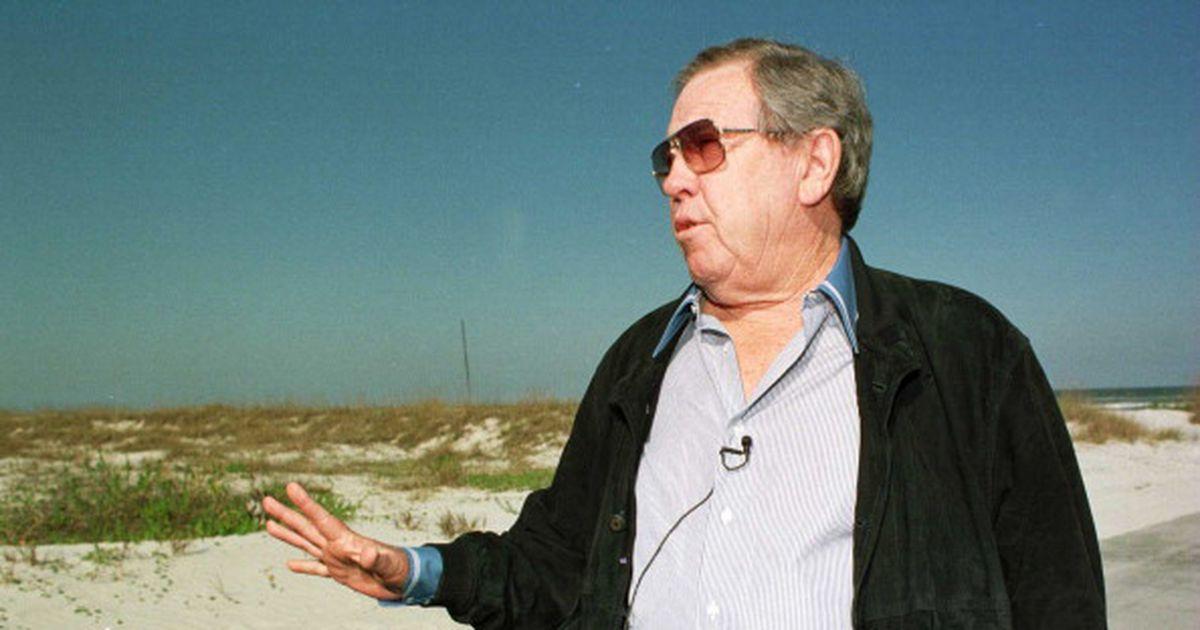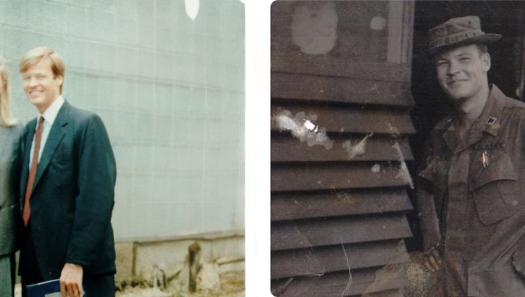WeSalute Awards
TopVet: Bill France, Jr., NASCAR

Bill France, Jr. was maybe six months old the first time he posed in a race car. It was an open wheel, Indianapolis-like vehicle, he said, recalling a baby picture. Very few infants were photographed among racing regalia back in 1933, but the setting was natural for Bill France, Jr.: His father, Big Bill France, was one of the pioneers of motorsports.
It was Big Bill who in 1948 founded NASCAR, the National Association of Stock Car Automobile Racing. He took a dirt track, backwoods diversion then popular across pockets of the rural South and by dint of personality and force of will transformed it into a regional entertainment of modest proportions.
It was Bill France, Jr., who, after inheriting control of NASCAR in 1972, combined vision and business acumen to guide the sport through three decades of exponential growth. NASCAR racing was the boom sport of the 1990s, attracting a national following and demographics that have made sponsors smile: In 2003, 6.7 million people attended NASCAR’ Nextel Cup races and some nine million more viewed an average race on television. And, as if proof weren’t needed that the sport had arrived, consumers that year spent some $2.1 billion on merchandise licensed by NASCAR.
It was the successes of his stewardship that have made Bill France, Jr., into a billionaire.
France, who handed the reins of the operation to his son, Brian, in 2003, is quick, however, to acknowledge his heritage. "I was fortunate because I had the base. I had the car with four wheels," he said in a telephone interview. "All I did was sit in the driver’s seat and steer it and put some fuel in it. I was lucky," he added, "that I didn’t hit any bad potholes."
Most observers, though, view his contributions to the sport as much more significant.
Paying His Dues
Growing up around stock cars and motorcycles, Bill France, Jr. "kind of wanted, like all sons of drivers, to be one of the race drivers," he said. "That was where the fun was. That was where the glamour was."
As he got into it, though, he found out that "it was hard to be a driver and do all the other things on the business side." These "other things" included helping out in the concession stands and parking cars, repairing tracks and putting up guard rails, and advertising races by posting one-sheet posters on the sides of tobacco barns. Although not exactly the stuff of glamour, this did give young Bill a thorough grounding in the family business.
The business was based in Daytona Beach, Florida, where Bill France, Jr., who was born in Washington, D.C., grew up. After graduating high school and attending college at the University of Florida at Gainesville, he spent two years in the Navy in the mid-1950s.
He was an ordnance man, loading guns and bombs and rising to the rank of Petty Officer 3 rd Class. "I don’t know if my service in the Navy helped me mature that much," he reflected. "I was a typical young sailor, independent for the first time." His experiences in the Navy, though, reinforced his work ethic and sense of responsibility.
When his stint in the service ended, Bill France, Jr., returned home and immersed himself in the world of racing, taking on increasing responsibility in a burgeoning business. This included construction of the now world-famous Daytona International Speedway in a swampy section of his home town.
"We went seven days a week for 13 months to build the Speedway. We went from seven in the morning to seven at night, and worked in the winter until it got dark," he told a reporter for the Motorcycle Hall of Fame, to which he was inducted in 2000. He has also been inducted into the Stock Car Racing Hall of Fame and, most recently, the International Motorsports Hall of Fame.
The mammoth project was not without its hazards. "I ran a motor grader some and a bulldozer, but mostly I was on a compactor," he said. "We’d have big piles of stumps that we had to burn. I remember seeing a big rattlesnake out there one day," he recalled. One of the workers asked him where he had seen the rattler.
"I pointed to where I found it," France said. "This one man had an ax and he swung it into a stump and we heard rattles buzzing all over the place. The area was full of snakes. We cleared out of there pretty fast."
Expanding the Vision
France’s interest in off-road motorcycling inspired him to make motocross part of the panoply of racing at Daytona in the early 1970s. It has since grown into the enormously popular Daytona Supercross.
"I thought motocross was going to be a big thing," France told the Motorcycle Hall of Fame. "At first, we ran the race by the lake in the back section of the Speedway. My dad was the one who suggested we move the race up in front of the grandstands. After that it really took off and started attracting big crowds." The Supercross has helped Bike Week attract upwards of half a million motorcyclists to Daytona Beach in early March – the biggest week of motorcycling in the country.
Bill France, Jr.’s foresight in this arena is perhaps matched by his success in forging mutually beneficial relationships with industry sponsors of motorsports: Nextel, Rolex, Pepsi, Goodrich, Goodyear, Procter & Gamble, Boeing, Ford, and General Motors, to name but a few. These companies and scores of others annually pay as much as $15 million each to racing teams to have their logos emblazoned on their cars.
He was also successful in attracting television to cover NASCAR races, which has only added to their popularity. "TV came along and took events from the race track into homes. And as technology improved with in-car cameras and helmet cams, we could make entertaining programs for viewers for three or four hours." Today, the sport is worth almost $3 billion in TV rights.
With the future full of promise, especially considering our national thirst for vicarious thrills, Bill France, Jr., has eased out of the day-to-day running of his racing empire with a reputation as legendary as that of his father. And when the racing cognoscenti think of their sport, they think not only of Dale Earnhart and Richard Petty and Jeff Gordon, but of the Frances – Bill and Big Bill and, now, of Brian.
Image Credit: Fox Sports, http://www.foxsports.com/nascar/story/bill-france-jr-jeff-gordon-richard-petty-happy-birthday-the-man-who-changed-nascar-040416


